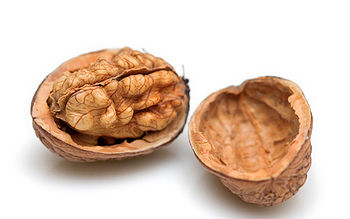English Walnut
From Wikiwel
Other Names:Akschota, Arbre au Sommeil, Coque de Noix, Feuille de Noyer Commun, Fructus Cortex, Gland Divin, Gland de Jupiter, He Tao, He Tao Shu Zhi, Hu Tao Ren, Juglans, Juglandis, Juglandis Folium, Juglans regia, Nogal, Nogal Inglés, Noix Anglaise, Noix de Grenoble, Noix Italienne, Noix Perse, Noyer Anglais, Noyer Commun, Noyer de Grenoble, Noyer Royal, Walnussblätter, Walnussfrüchtschalen, Walnut, Walnut Fruit, Walnut Hull, Walnut Leaf.
See also : Black Walnut
Special Precautions of English Walnut
- Walnuts alergy is one of the most serious types of food alergies. Walnut alergies are normally connected with the allergies to tree nuts typically like Brazil nuts, almonds and hazelnuts. Although the basic reasons for nuts causing allergic reactions are yet to be recognized, but the increase in dominance is perhaps because of its extensive use in various food products. Sensitivity is frequently intense even with just a little quantity of the allergen are competent of aggravating the quick and stern kind of alergic response. This may lead to develop severe or pharyngeal swelling and organized circulatory effects which could end up in asphyxiation as well as life threatening anaphylaxis. For the alergic persons walnuts are well identified cause of severe and fast developing symptoms like vomiting, diarrhoea, urticaria, angioedema, severe abdominal pain, atopic eczema, asthma and anaphylactic shock.
- The nut can cause softening of the stools and bloating, as well as weight gain unless other fats are removed from the diet. English walnut may cause allergic reactions in people who are sensitive to it.
The benefits of English Walnut are
The nut of the English walnut contains chemicals called fatty acids, which might be useful as part of a cholesterol-lowering diet. It also contains chemicals that can expand blood vessels, possibly improving circulation and the way the heart works.
- It's a great source of the healthy omega-3 essential fatty acids (Alpha Linolenic Acid (ALA)) , which have been found to protect the heart, promote better cognitive function, and provide anti-inflammatory benefits for asthma, rheumatoid arthritis, eczema and psoriasis.
- A handful of walnuts contains almost twice as many antioxidants as an equivalent amount of any other commonly consumed nut : Walnuts contain several antioxidants, such as melatonin and quinone juglone, that cannot be found in other nuts.
- Source of Ellagic Acid : Walnuts also contain the antioxidant compound ellagic acid, which is known to fight cancer and support the immune system.
- researchers identified 16 polyphenols in walnuts, including three new tannins, with antioxidant activity so powerful they described it as "remarkable."
- Walnuts are incredibly healthy for the heart. A study in the April 2004 issue of Circulation found that when walnuts were substituted for about one-third of the calories supplied by olives and other monounsaturated fats in the Mediterranean diet: Total cholesterol and LDL (bad) cholesterol were reduced. The elasticity of the arteries increased by 64 percent. Levels of vascular cell adhesion molecules, which play a major role in the development of atherosclerosis (hardening of the arteries), were reduced
- Walnuts are one of the best plant sources of protein.
- They are rich in fiber, B vitamins, magnesium, and antioxidants such as Vitamin E : not the common form of vitamin E (alpha-tocopherol). Walnuts are packed with the gamma-tocopherol form of vitamin E, which provides enhanced antioxidant activity and significantly reduces the risk of heart disease and its symptoms.
- Nuts in general are also high in plant sterols and fat - but mostly monounsaturated and polyunsaturated fats (omega 3 fatty acids, in particular, alpha-linolenic acid ALA) that have been shown to lower LDL cholesterol.Walnuts have significantly higher amounts of ALA omega 3 fatty acids compared to other nuts.
- More than a decade of scientific evidence shows that incorporating walnuts in a healthy diet reduces the risk of Heart Disease by improving blood vessel elasticity and plaque accumulation.
- Walnuts have also been shown to aid in the lowering LDL cholesterol (the bad cholesterol) and the C-Reactive Protein (CRP). CRP was recently recognized as an independent marker and predictor of Heart Disease.
- Walnut contain ellagic acid, an antioxidant compound that helps supports the immune system and contain several anticancer properties.
- Contains the highly potent phytonutrient quinone juglone that destroys cancer and precancerous cells while leaving healthy tissue intact.
- Walnut has a mild laxative effect, it is beneficial in cases of constipation.
- Walnut is recommended for patients with liver ailments (Liver Diseases).
- Reduce the risk of Breast Cancer.
- Walnuts help protect against Prostate Cancer.
- Can improve the health of sperm, according to research published in the medical journal Biology of Reproduction.
